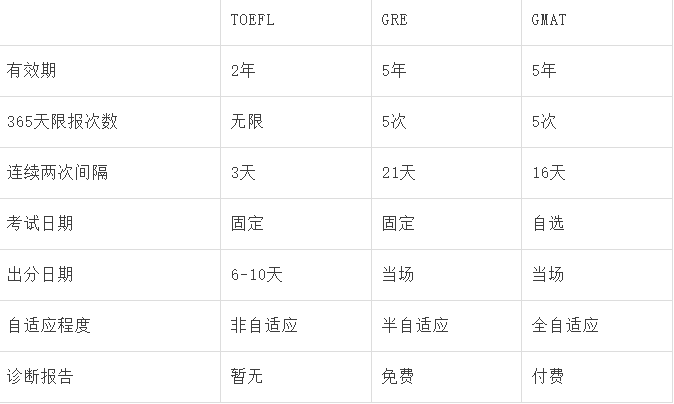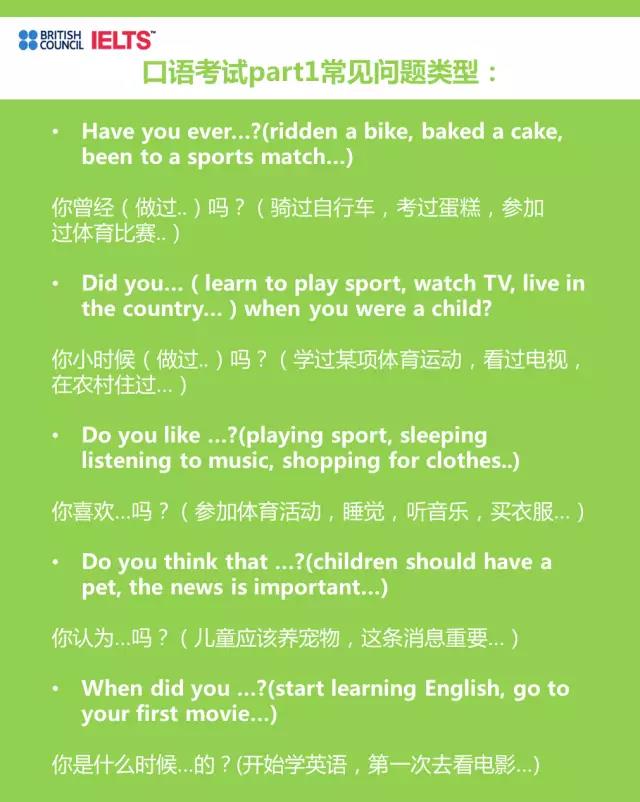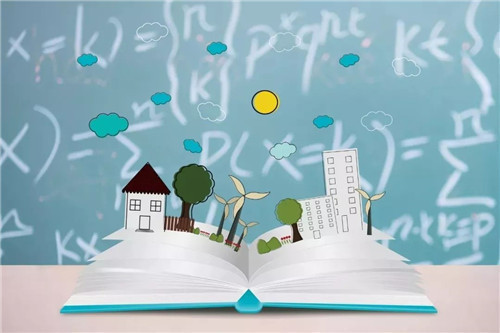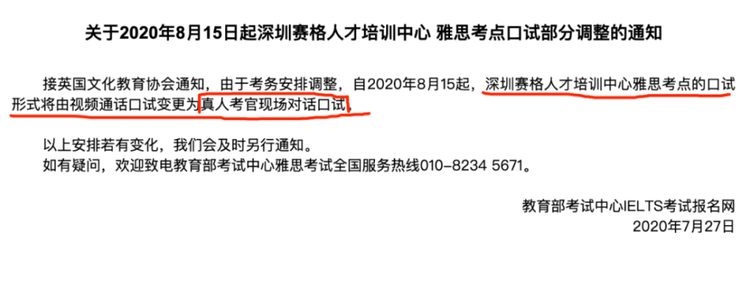時(shí)間&精力--雅思口語(yǔ)復(fù)習(xí)投放有技巧!小編今天給大家?guī)?lái)了雅思口語(yǔ)復(fù)習(xí)投放有技巧,希望能夠幫助到大家,下面小編就和大家分享,來(lái)欣賞一下吧。
時(shí)間&精力--雅思口語(yǔ)復(fù)習(xí)投放有技巧
自雅思考試設(shè)立以來(lái),口試一直是使諸多考生覺(jué)得"難"以啟齒的一項(xiàng):一方面,雅思口試的話題范圍都非常生活化。從簡(jiǎn)單的自身學(xué)習(xí)或工作介紹,到被認(rèn)為是最難的科學(xué)發(fā)明、環(huán)保,都沒(méi)有超出日常討論的范圍,也不包括任何專業(yè)性的內(nèi)容,就這點(diǎn)來(lái)說(shuō),雅思口試和托福TSE或其它同類口試相比,要簡(jiǎn)單得多;但同時(shí),雅思口語(yǔ)的涉獵面之廣,卻又使考生在復(fù)習(xí)時(shí)感覺(jué)非常棘手。
如果每個(gè)話題都要輪著復(fù)習(xí)過(guò)來(lái)的話,復(fù)習(xí)一圈下來(lái)在時(shí)間和精力上的浪費(fèi)都堪稱huge。可悲的是,哪怕全部復(fù)習(xí)過(guò)了,考試的時(shí)候還有可能遇上頭腦空白,不知所云的情況;抑或雖然考到了復(fù)習(xí)的內(nèi)容,但考試的內(nèi)容和復(fù)習(xí)的范圍相比,只是冰山之一角,考生為之耗費(fèi)的時(shí)間精力,卻如湖面下的冰山,大都湮沒(méi)于無(wú)形,這種復(fù)習(xí)效率的"性價(jià)比"實(shí)在太低。
面對(duì)時(shí)間和精力的雙重壓力,唯有正確運(yùn)用復(fù)習(xí)策略方能運(yùn)籌于帷幄之中,決勝于千里之外;唯有將復(fù)習(xí)與應(yīng)試技巧相結(jié)合方能在口試時(shí)應(yīng)對(duì)如滔滔江水,連綿不絕。筆者分別就復(fù)習(xí)時(shí)間的把握和精力的投放上作一番探討,望能助考生在復(fù)習(xí)的苦海上找到希望的燈塔,在絕望的邊緣看到勝利的曙光。
一、復(fù)習(xí)時(shí)間的把握
考生在培訓(xùn)結(jié)束到考試的間歇階段一般應(yīng)控制在一到二個(gè)月左右。間隔短了可能復(fù)習(xí)不夠充分,心理上容易產(chǎn)生緊張焦慮;間隔長(zhǎng)了可能出現(xiàn)效率低下、惰性太大的現(xiàn)象,正如背單詞強(qiáng)調(diào)的"一而作,再而衰,三而竭"的定律,口語(yǔ)復(fù)習(xí)也應(yīng)趁熱打鐵,力求在短期內(nèi)"直搗黃龍",一舉攻破話題重點(diǎn),在考試之前保持清醒的頭腦。
當(dāng)然,除了整體把握時(shí)間之外,還應(yīng)將復(fù)習(xí)時(shí)間量化,具體落實(shí)到每一天。每天考生都應(yīng)辟出一定的時(shí)間進(jìn)行口頭操練,在小時(shí)數(shù)上應(yīng)秉持"貪多嚼不爛"的原則,根據(jù)個(gè)人承受能力選擇時(shí)間,建議在一到兩小時(shí)左右。因?yàn)榭谠嚭推渌?xiàng)目不同,是考生和考官的互動(dòng)過(guò)程,因此在自我演練的時(shí)候應(yīng)該克服自身惰性,按照考試流程做課件和教材上的練習(xí)。
考生可根據(jù)課件和教材上面的參考答案來(lái)評(píng)判自身尚存的差距。在答案的評(píng)判上應(yīng)該注意"踩點(diǎn)"原則,將話題的重點(diǎn)作為回答的第一標(biāo)準(zhǔn),因?yàn)檫@些都將是考試的得分點(diǎn)。
下面我以實(shí)例講述復(fù)習(xí)時(shí)間的拿捏方法。口語(yǔ)話題按照大類可以分為基本情況介紹(如考生的學(xué)習(xí)和工作、家鄉(xiāng)、城市、建筑、愛(ài)好、人物、節(jié)假日、派對(duì)、科技、發(fā)明等),而精分一下則可以擴(kuò)展至大約二十幾個(gè)。因此如果把復(fù)習(xí)時(shí)間定為一個(gè)月三十天,把話題一共cover兩遍的話,那么基本上一天復(fù)習(xí)兩個(gè)話題足矣。每個(gè)話題花一小時(shí)左右復(fù)習(xí),一天用兩小時(shí)練口語(yǔ)。
至于針對(duì)每個(gè)話題的具體操作方法,筆者以"學(xué)習(xí)"這個(gè)話題來(lái)具體描述。考生首先應(yīng)該明確每部分的涉獵范圍、出題模式,同時(shí)也應(yīng)按照該話題在三部分的順序由淺至深地依次回答,答題時(shí)可以先自己口頭做一遍,再看參考答案和得分點(diǎn),看到自己離高分答案的尚存差距,有則改之,無(wú)則加勉。如果每個(gè)話題都能照此方法復(fù)習(xí),那么必能熟練掌握口試流程并對(duì)每個(gè)話題做到在理解上駕輕就熟。
比如涉獵范圍和出題模式,在關(guān)于"學(xué)習(xí)"的三部分考題中,第一部分是關(guān)于考生的就讀專業(yè)、專業(yè)選擇原因以及對(duì)課業(yè)的好惡等。而第二部分則是對(duì)學(xué)校的描述、課程的描述等。第三部分更進(jìn)一步地談?wù)摰缴鐣?huì)層面的問(wèn)題,如談及教育問(wèn)題,讓你給出建議等。
至于參考答案和得分點(diǎn),比如看到選擇專業(yè)的原因,一般參考答案會(huì)提及自己對(duì)此比較感興趣,如I enjoy every minute of it,或者說(shuō)It suits me。雖然理論上講口語(yǔ)不應(yīng)該有什么參考答案,但是對(duì)基礎(chǔ)相對(duì)比較薄弱的考生而言,這絕對(duì)是能一招制勝且不露痕跡的"葵花寶典"。在短時(shí)期能使考生對(duì)口試的大致范圍做到胸有成竹。
二、精力的投放
為了應(yīng)付口試中廣泛的話題,很多考生在口試的復(fù)習(xí)過(guò)程中一味求全、求多,想盡力cover所有的問(wèn)題。可是總覺(jué)得"野火燒不盡,春風(fēng)吹又生",一道題未搞定,一道題又侵襲--殊不知,"題海戰(zhàn)術(shù)"行不通。
其實(shí)口語(yǔ)在練習(xí)時(shí)應(yīng)注意橫著練和豎著練。豎著練是按口試三部分的順序練。每部分適當(dāng)?shù)孛刻爝x幾個(gè)題練習(xí)可以是三部分選一個(gè)話題,也可以三部分分別從各個(gè)話題中選出來(lái)練習(xí)。在上文中舉的"學(xué)習(xí)"一例就是按照豎練來(lái)做的。
而橫著練則是一項(xiàng)更為重要的復(fù)習(xí)技巧,也是口試復(fù)習(xí)的重點(diǎn)。所謂的橫著練,是指復(fù)習(xí)時(shí)很有必要注意話題的相通性。如果說(shuō)生活是一本有章節(jié)的書,那么以日常生活作為話題的雅思口試就有很多相互關(guān)聯(lián)的話題。比如說(shuō)和媒體相關(guān)的包括有電視、電影、閱讀、音樂(lè)、廣告等。本來(lái)這么多考題對(duì)考生來(lái)說(shuō)是一種壓力,但如果考生能意識(shí)到這些話題的應(yīng)對(duì)有很多相同的地方,那么在答題時(shí)一定會(huì)進(jìn)入一個(gè)別有洞天的境界。
仍然以媒體為例,口試中有一類描述性的題,如描述某個(gè)音樂(lè)、某部電影、某本書或是某個(gè)廣告等等。當(dāng)然考生會(huì)分別使用各種形容詞來(lái)形容這些對(duì)象,但在復(fù)習(xí)時(shí)如果孤立地以每一道題為單位來(lái)記憶描述的詞匯,就會(huì)做大量重復(fù)性的工作,因?yàn)橛行┬稳菰~對(duì)上述的話題都適用,如impressive, touching等等。可以試著選擇一些比較大的詞匯,它們往往是"一個(gè)扔出來(lái),適用一大片"的回答。
另外再舉個(gè)例子。很多人在準(zhǔn)備口語(yǔ)時(shí)往往擔(dān)心要不要背句型,他們面對(duì)句型時(shí)總有"句型,要想背你好難"的感受。一方面覺(jué)得口語(yǔ)很靈活,沒(méi)法套句型,另一方面又覺(jué)得背不下來(lái)。但正如寫作要背句型一樣,要考好口語(yǔ)最好也能會(huì)一點(diǎn)句型,但切記要寧缺毋濫!
比如在第三部分雅思考官往往要你指出目前中國(guó)在某個(gè)方面最大的某個(gè)問(wèn)題。如談到人口就是人口太多,環(huán)境問(wèn)題就是吸煙、溫室效應(yīng)或酸雨等。其實(shí)無(wú)論碰到哪種社會(huì)現(xiàn)象或問(wèn)題,你都能用I'm deeply/strongly concerned about _______這個(gè)句型來(lái)談某個(gè)問(wèn)題,表示出你對(duì)此的擔(dān)憂。這就是比較客套、比較合理的一種表達(dá),而不總是盯著worry about, think about這些表達(dá)不放,用詞顯得毫無(wú)特色,也沒(méi)什么地道可言。
因此,如果考生能學(xué)會(huì)概括話題,盡可能地使用適用面非常廣的詞或句型,就能大大地節(jié)省復(fù)習(xí)時(shí)間,達(dá)到事半功倍的效果。相反,考生只會(huì)被淹沒(méi)在題海中不可自拔。
上述兩點(diǎn)是對(duì)考生備考口試的建議,祝大家復(fù)習(xí)快樂(lè),口試成功!
雅思口語(yǔ)題庫(kù)part1話題答案:musical instruments樂(lè)器
1. Which musical instrument do you like listening to most? (Why?)
My favourite musical instrument to listen to is the guitar. I like the fact that there are different types of guitar, like classical, acoustic and electric. I love the variety of sounds a guitar can make.
2. Have you ever learned to play a musical instrument?
I took some guitar lessons when I was younger and still have a guitar at home. I don't play it much nowadays. I wish I had more time to practise.
3. Do you think children should learn to play an instrument at school?
Yes, I think it's a great skill and it's really enjoyable to be able to play a musical instrument. All children should be given this opportunity.
4. How easy would it be to learn to play an instrument without a teacher?
It would probably be more difficult without a teacher. You need someone to show you what to do and correct your mistakes. You need a lot of discipline to teach yourself.
相關(guān)詞匯資料
Musical Genres
classical; jazz; rock and roll; folk; opera; pop; contemporary music
rap; hop-hop; blues; RnB; pop; Kpop; Jpop; heavy metal; punk
Playing Musical Instruments
a soulful singer; a virtuoso musician; a talented pianist; a skilled violinist; learn a musical instrument; practice makes perfect
Listening to Recorded Music
I enjoy listening to some great sounds; I like to chill out listening to music; a classic recording; recorded music; live music; a live album; I listened to an old CD through my headphones
Concerts and Live Music
go to a concert; go to a gig; catch a performance in a concert hall; see a show in a theatre; I prefer live music to recorded music; the venue was just a bar; I once saw the London Symphony Orchestra perform Vivaldi
Songs
a song; a pleasant melody; a catchy tune; a groove; a fast beat; a nice piece of music; an uptempo song; Lennon and McCartney composed this song; Mozart is my favourite composer; I like Beethoven’s symphonies
雅思口語(yǔ)part2話題答案:wait for something to happen
Describe a situation you waited for something to happen.
You should say:
when and where it happened;
what you waited for;
how long you waited for it;
and explain how you felt about waiting.
參考范文:
Ok right then, well after thinking for a little bit just now, what I’ve decided to talk about is the time I waited for a boat at the West Lake in Hangzhou. And as for when this happened, well I suppose it must have been about two or three months ago by now, and it was on a weekend, so we kind of knew that there would be a long queue for the boats!
So yeah, when we got there, we were told that there would be a wait of about an hour or so, at least, which was what we pretty much expected. But we didn’t feel like twiddling our thumbs and hanging around for an hour doing nothing, so instead, what we actually decided to do was to get a ticket number first and then go for a walk around the lake, have lunch and then come back again in the afternoo n. Do it that way!
And I’m glad to say that, when we went back later and showed the guy our ticket, he told us we could get on the next boat. So we felt pretty good about it, and it was quite a relief as well, cos I mean, he could have told us that we missed our turn and would have to get another ticket number, you know, like they do in the bank. But thankfully, he took pity on us, especially after I’d said that we had waited for about 4 hours! So yeah, it all worked out pretty well for us, cos we almost immediately got onto a boat. I’m not sure the other people waiting were very impressed, cos it kind of looked like we were queue barging, but anyway, that’s basically what happened!
So that’s about it, thanks for listening!
亮點(diǎn)詞匯:
Queue –隊(duì)伍 (it can be used as a noun or verb)
Wait – here it is used as a noun
It was what we pretty much expected. – 跟我們想象的差不多一樣
twiddling our thumbs – do nothing, 無(wú)所作為 (撫弄大拇指)
hanging around -閑呆著
it was quite a relief -令人慶幸,讓我們松了一口氣
he took pity on us – 他同情了我們
it all worked out pretty well for us - 最終結(jié)果不錯(cuò)
queue barging – jumping the queue, 插隊(duì)
雅思口語(yǔ)part2話題答案:a helpful person in work or study
Descirbe a helpful person in work or study
You should say:
who the person is
what kind of person he/she is
how this person help you
why do you think this person is helpful
參考范文
Ok, so i'd like to talk about a person that i know has done a lot of work to help people, And...this is my grandmother on my father's side. She lived near my childhood home back in the United States and I used to go to her house every, uh, almost every other weekend, umm, because we had a big family and so we'd have lots of events up at my grandparent's house. And, you know, what...what my grandmother did to help people, well, i think there are lots of things...
But one of the main things is that she used to volunteer at a hospital, umm, reaaly often. You know, i was young so i don't know exactly how often she would volunteer but it was definitely a common thing. And i remember my parents talking about this when i was younger and stuff like that. But i really felt it when i was back visiting home one time and i had to visit the hospital for something. And while was waiting a lady come out and talked to me and she said she had known my grandmother and worked with her when she was at the hospital. And that she was always so impressed and really admired, umm, my grandmother and her kindness and how much she gave to the people around her. So that was quite an interesting conversation for me. And i really felt like it was meaningful and my grandmother had been doing meaningful things for the people around her. Um, you know, other than at the hospital of course she took care the people in my family so she would host birthday parties and make lots of different kinds of food and...just always giving to other people so i think she set a really good example in that sense and um, i hope that i'll be able to be a giving and helpful person like she was in the future.
雅思口語(yǔ)題庫(kù)part1話題答案:letters and emails
1.At work or in your studies, do you often write things?
Yes, I write a lot of emails as part of my job. I work for a company that has offices in several countries, so we use email to communicate.
2.How often do you send e-mails?
I probably write between 5 and 10 work emails every day, and I send emails to friends or family a few times a week.
3.Do you prefer to write by hand or on a computer?
It depends what I’m doing. I prefer the computer for most things because it’s faster and you can save or copy things, but I still like making notes or writing ideas down by hand.
4.Do you prefer to send letters or emails?
I prefer to send emails they’re so much quicker and easier. But then again I suppose letters are more personal and a bit more special. I certainly prefer to receive letters and I guess my real answer is that I get more pleasure out of sending letters too.
5.Do you think computers might one day replace handwriting?
No, I think we will always write by hand as well. I think it’s an important skill, and schools will continue to teach children to write by hand before they learn to type.
擴(kuò)展語(yǔ)料:寫信時(shí)的各種禮貌規(guī)范用語(yǔ)
Apologizing
I'm sorry about...
I am sorry that...
I'm very sorry about...
I'm very sorry for...
Please forgive me for...
I'd like to apologize for...
Please accept my apologies.
Please accept my sincere apologies. (very formal)
Asking for Help
I'd be grateful if you could...
I would be grateful if you could...
I would appreciate it if you could...
Could you please...
I was wondering of you could help me.(informal)
I would like to know...
Asking for Information
I am writing to enquire about...
I am writing to find out about...
What I am looking for is...
I would like to know about/if...
Closing
I look forward to seeing you.
I look forward to hearing from you.
I look forward to meeting you.
Complaining / expressing dissatisfaction
I'm writing to express my dissatisfaction with...
I'm writing to express my annoyance with...
I am not happy about...
...was very disappointing.
Conveying regards
Please give my best regards to your family.
Please pass on my best wishes to your wife and children.
Please give my regards to your parents.
Expressing satisfaction
I was delighted to hear that...
I was very happy to learn that...
I was thrilled to find out that...
I was glad to hear that...
...was very enjoyable.
Expressing concern / sympathy
I was sorry to hear about... (your accident/ illness)
I am writing to express my concern about...
Giving bad news
I regret to inform you that...(semi-formal)
I am sorry to tell you that...(informal)
I regret to advise you that...(formal)
I am afraid I have some bad news.(informal)
Giving good news
I am pleased to inform you that...(semi-formal)
I am delighted to tell you that...(informal)
I am happy to advise you that...(formal)
I thought you might like to know that...
Giving reasons
This is because...
This is because of...
This is due to... (formal)
This is as a result of...(formal)
This is owing to...(formal)
Making suggestions
Would it be a good idea to...
Perhaps it would be a good idea to...
Thanking
Thanks.
Thank you.
Thank you very much.
Thank you kindly.
I can't thank you enough.
No words can express my gratitude.
I am extremely grateful for...
I very much appreciate your ______ing
雅思口語(yǔ)復(fù)習(xí)投放時(shí)間精力有技巧相關(guān)文章:
★ 雅思口語(yǔ)如何正確跟讀
上一篇:雅思口語(yǔ)必考話題






